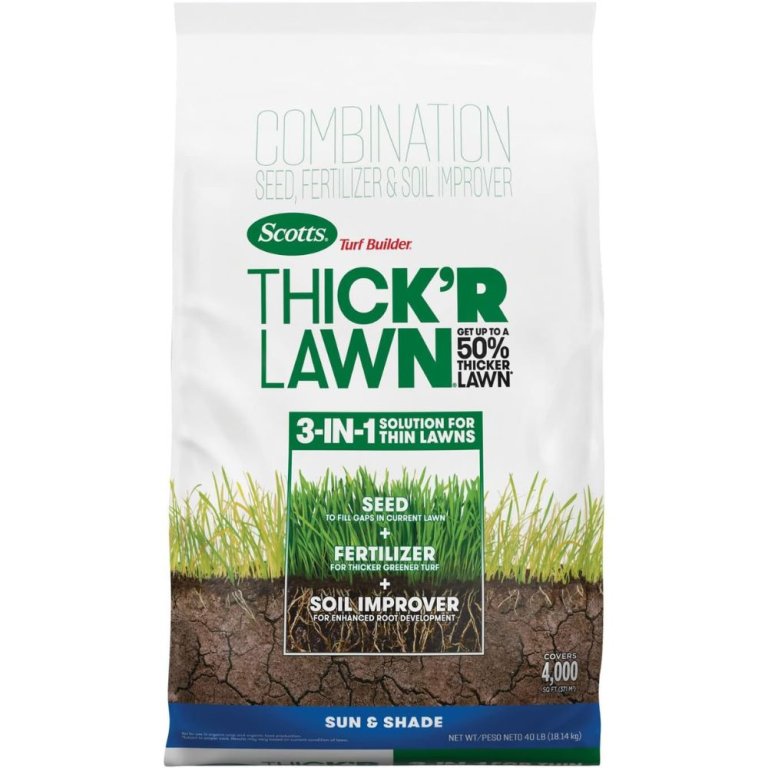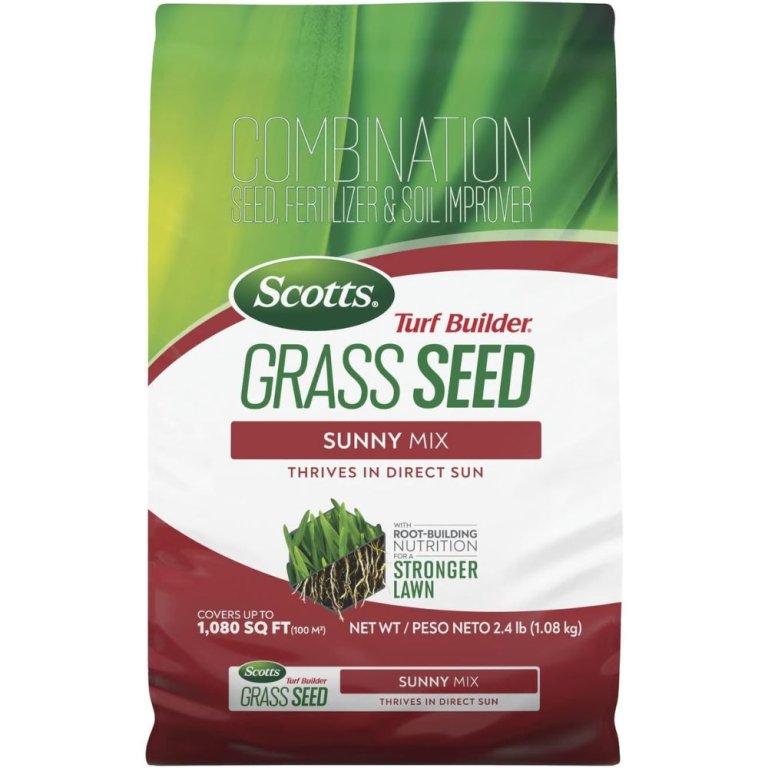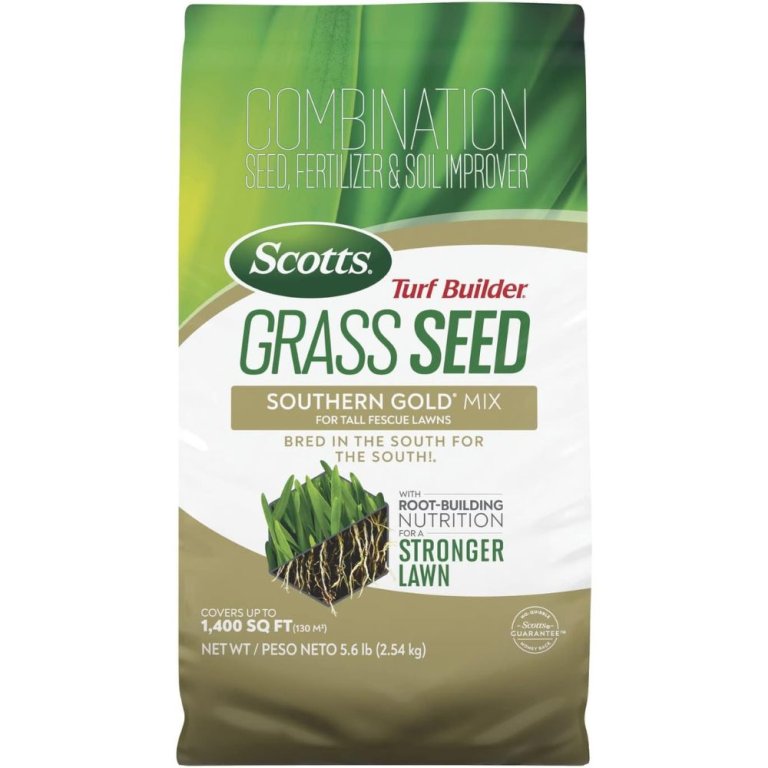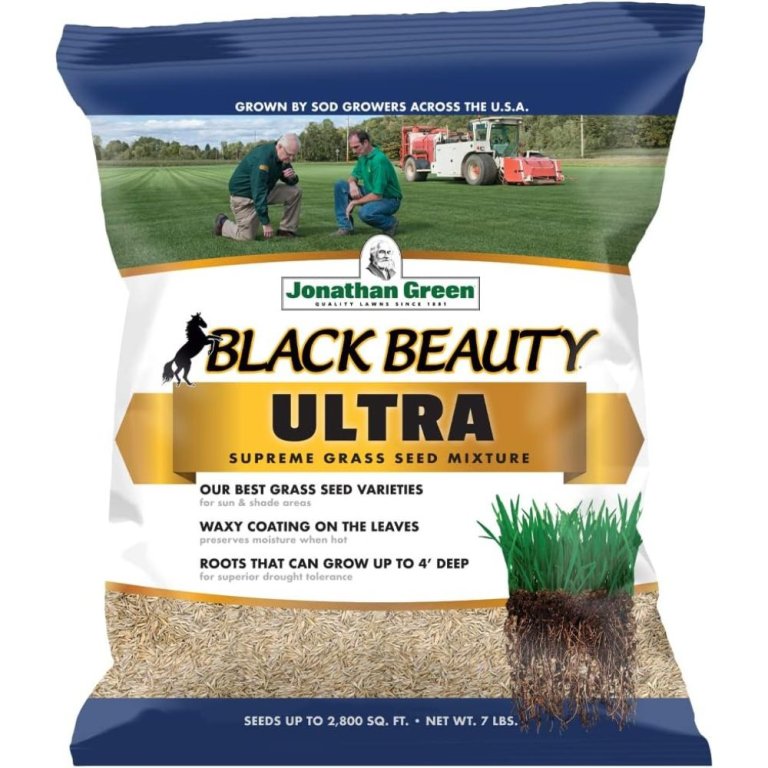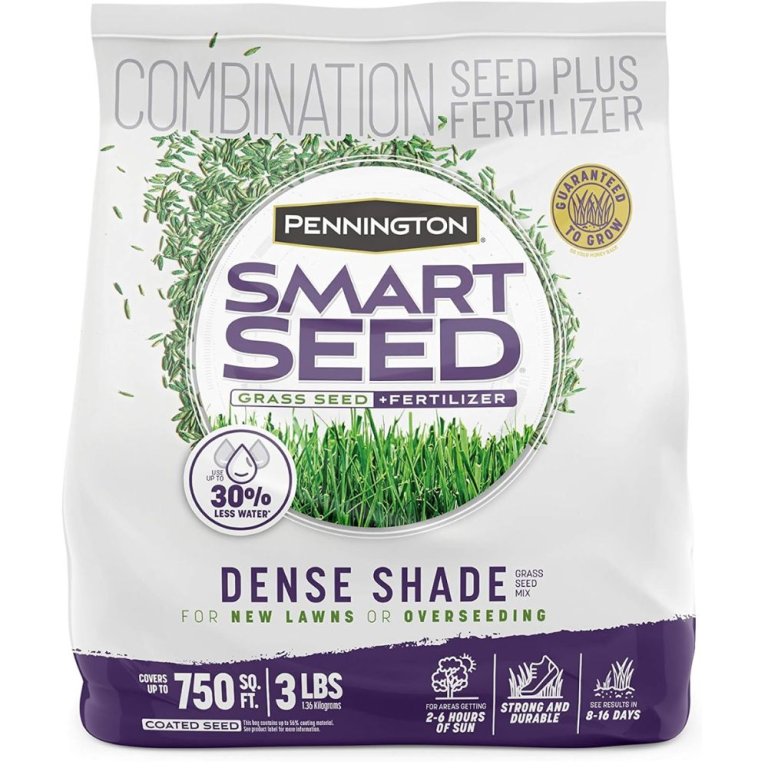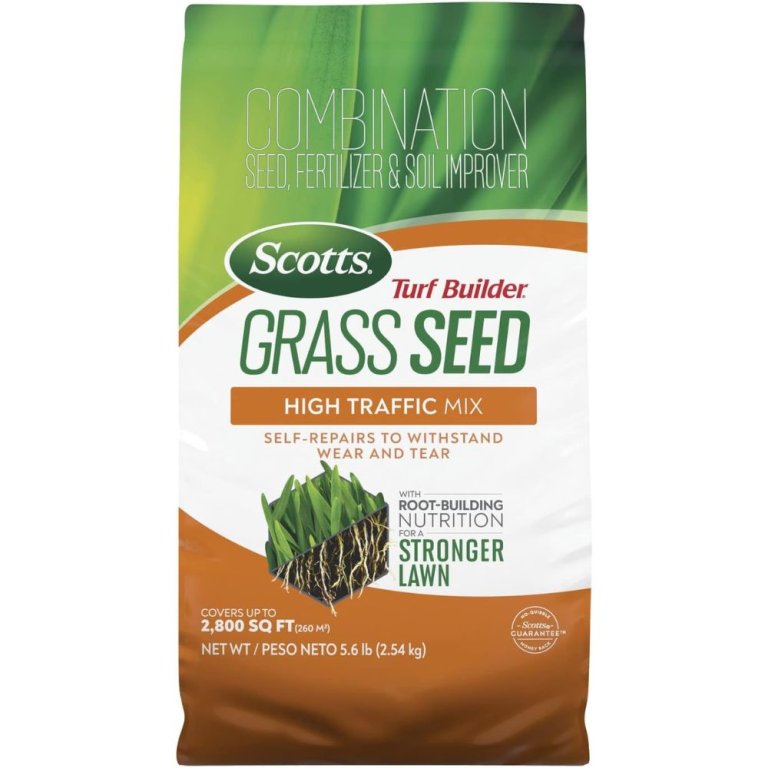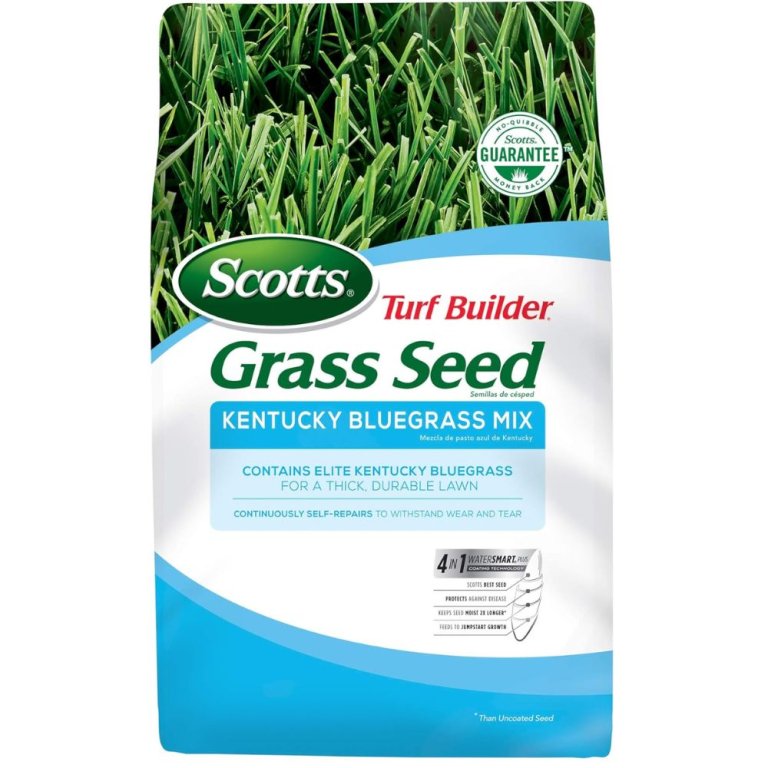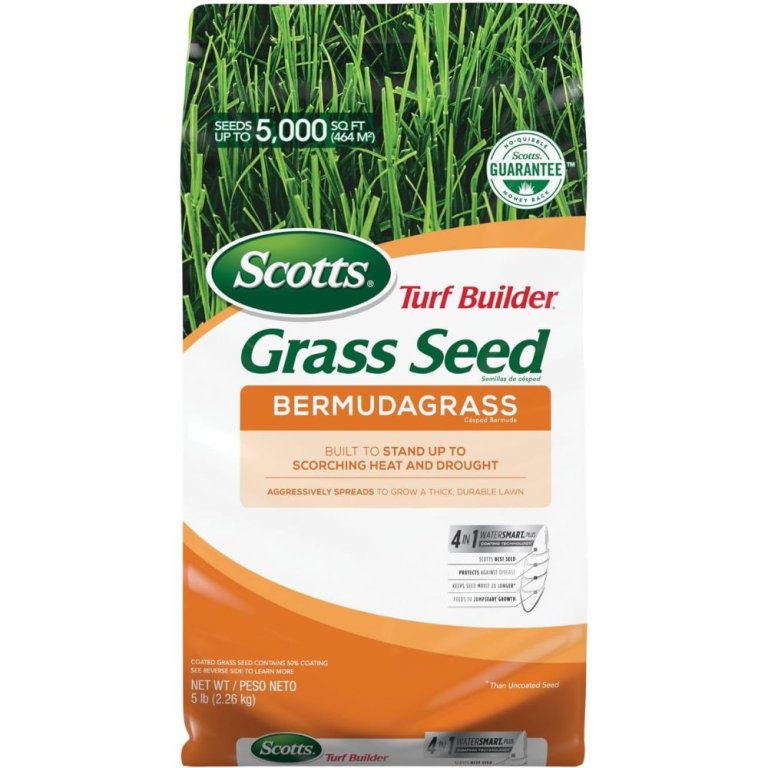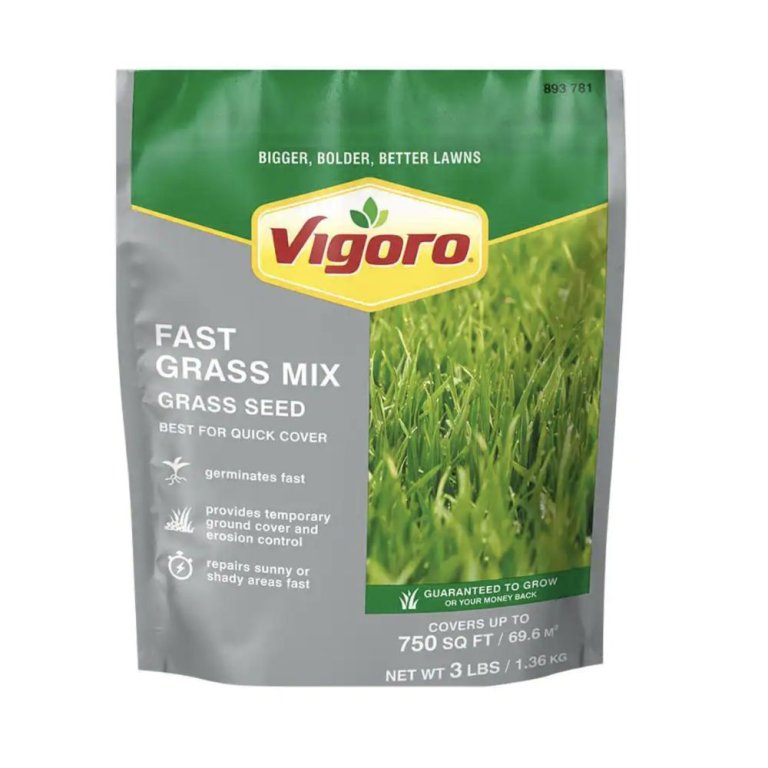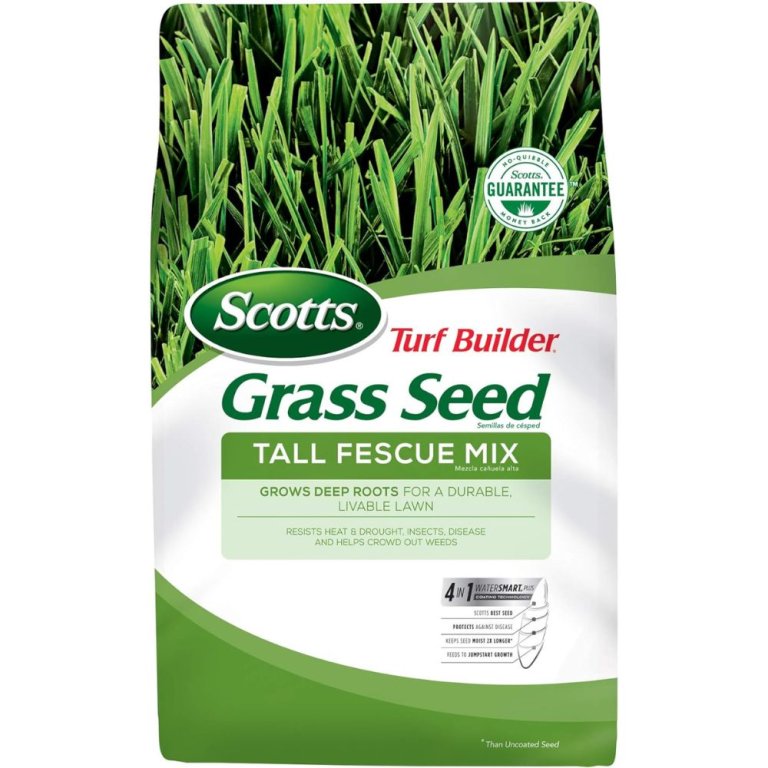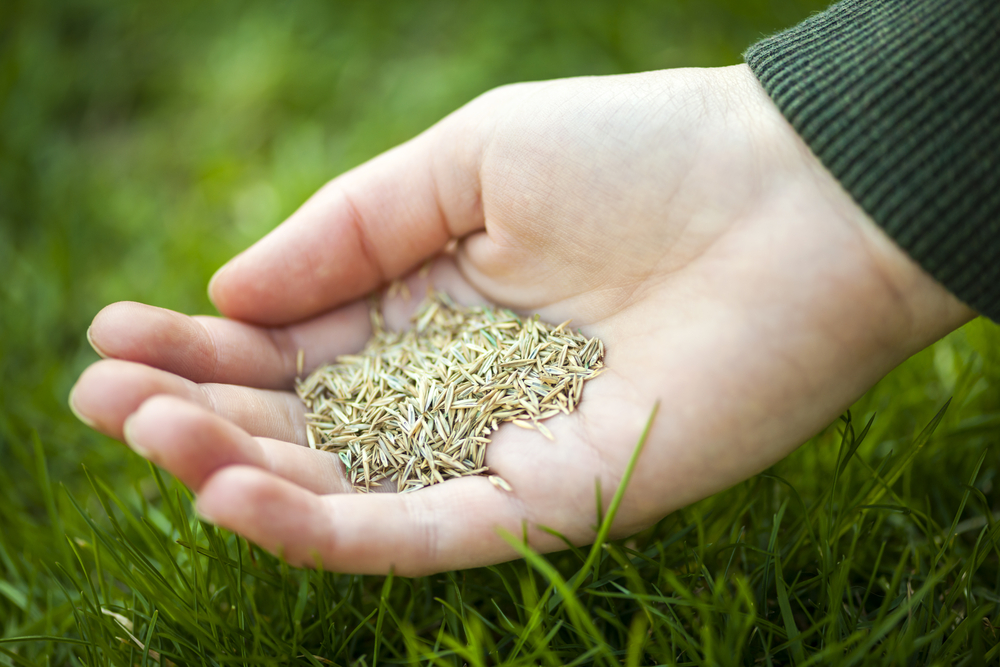
We may earn revenue from the products available on this page and participate in affiliate programs. Learn More ›
Growing a thick, lush lawn begins with choosing the right grass seed. However, the seemingly endless variety of available products can make it hard to narrow down the best option. Your local climate, specific yard conditions, and maintenance desires must all be considered.
After countless hours researching the top grass seed products, our number one recommendation is Scotts Turf Builder Thick’R Lawn Grass Seed. It contains a mix of drought and shade-tolerant grass types and includes a fertilizer and soil improver for thick, green lawns. However, it is a warm season grass seed that’s best for overseeding, so depending on your climate and needs, a different product on our list may be a better fit. To bolster our research, we interviewed landscaping professionals for expert advice on choosing a suitable grass seed based on climate, foot traffic, and lawn care goals. Below, we’ve listed the best grass seed products, organized by category, to make it easy to find the optimal variety for your lawn.
- BEST OVERALL: Scotts Turf Builder Thick’R Lawn Grass Seed
↓ Jump to Review - BEST BANG FOR THE BUCK: Scotts Turf Builder Grass Seed Sunny Mix
↓ Jump to Review - BEST WARM-SEASON: Scotts Turf Builder Grass Seed Southern Gold Mix
↓ Jump to Review - BEST COOL-SEASON: Jonathan Green Black Beauty Ultra Grass Seed
↓ Jump to Review - BEST FOR DENSE SHADE: Pennington Smart Seed Dense Shade Grass Seed
↓ Jump to Review - BEST FOR HIGH-TRAFFIC: Scotts Turf Builder Grass Seed High Traffic Mix
↓ Jump to Review - BEST KENTUCKY BLUEGRASS: Scotts Turf Builder Grass Seed Kentucky Bluegrass Mix
↓ Jump to Review - BEST BERMUDA GRASS: Scotts Turf Builder Grass Seed Bermudagrass
↓ Jump to Review - BEST FAST-GROWING: Vigoro Fast Grass Seed Mix
↓ Jump to Review - BEST LOW-MAINTENANCE: Scotts Turf Builder Grass Seed Tall Fescue Mix
↓ Jump to Review
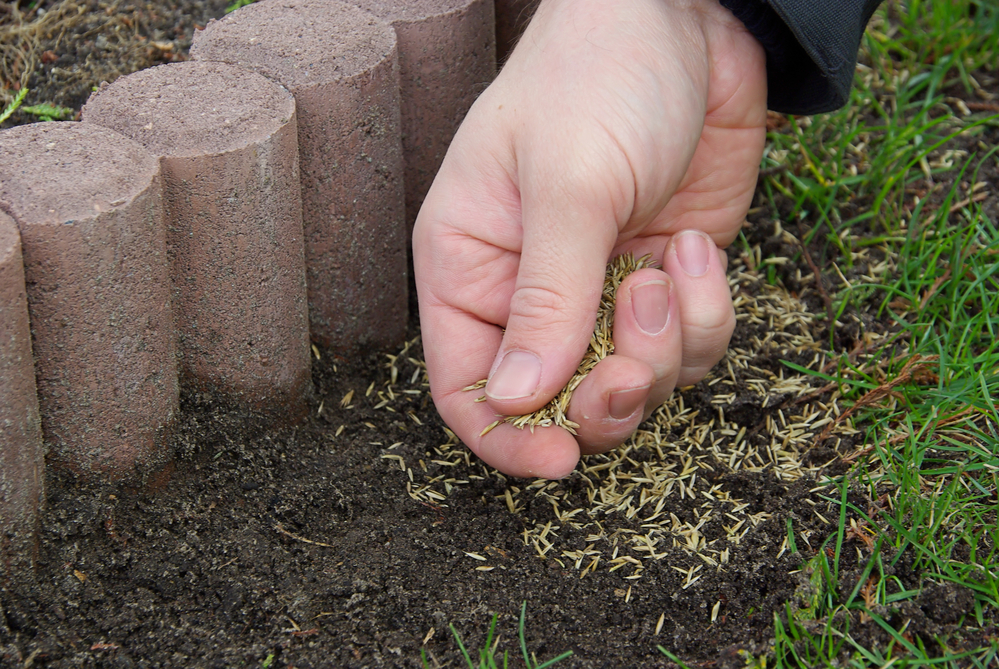
Grass Seed Comparison Chart
| Ideal Season | Reseeding vs. New Planting | Single Seed vs. Mix | |
| Scotts Turf Builder Thick’R Lawn Grass Seed | Warm | Reseeding | Mix |
| Scotts Turf Builder Grass Seed Sunny Mix | Cool | Both | Mix |
| Scotts Turf Builder Grass Seed Southern Gold Mix | Warm | Both | Mix |
| Jonathan Green Black Beauty Ultra Grass Seed | Cool | Both | Mix |
| Pennington Smart Seed Dense Shade Grass Seed | Cool or warm | Both | Single seed |
| Scotts Turf Builder Grass Seed High Traffic Mix | Cool | Both | Mix |
| Scotts Turf Builder Grass Seed Kentucky Bluegrass Mix | Cool | Both | Mix |
| Scotts Turf Builder Grass Seed Bermudagrass | Warm | Both | Single seed |
| Vigoro Fast Grass Seed Mix | Cool | Reseeding | Mix |
| Scotts Turf Builder Grass Seed Tall Fescue Mix | Cool | Both | Mix |
Our Top Picks
You can find good lawn grass seed for sunny areas, shade, high traffic, hot and cold climates, and more. These top-rated grass seed picks cover many lawn and grass types for various uses.
BEST OVERALL
Scotts Turf Builder Thick’R Lawn Grass Seed
What We Like
- Includes fertilizer, seed, and soil improver
- Provides a drought- and shade-tolerant mix
- Covers 4,000 square feet per 40-pound bag
What We Don’t Like
- Pricier than other grass seed options
Specs
- Ideal season Warm
- Reseeding vs. new planting Reseeding
- Single seed vs. mix Mix
Successfully reseeding a lawn often involves laborious processes such as prepping the soil and adding fertilizer before finally spreading the seed. Scotts reduces those three steps to one with its Thick’R Lawn grass seed. This premium grass seed improves the chances that your seed will germinate, grow, and flourish by mixing the necessary components in one bag to spread it on your lawn in one fell swoop.
This Sun and Shade grass seed includes fertilizer, organic material for improving the soil’s quality, and a mix of drought- and shade-tolerant grass seed. Simply rake, spread the seed, water daily, and let nature fill gaps in a lawn. A 40-pound bag is enough to cover a 4,000-square-foot area for reseeding.
Get the Scotts Turf Builder Thick’R Lawn grass seed at Amazon, Tractor Supply Co. (12-pound bag), or The Home Depot.
BEST BANG FOR THE BUCK
Scotts Turf Builder Grass Seed Sunny Mix
What We Like
- Thrives in sunny areas
- Features a 4-in-1 WaterSmart Plus coating
- Special coating provides disease resistance and aids germination
- 2.4-pound bag covers 1,080 square feet
What We Don’t Like
- Primarily designed for northern lawns
- Smaller seed quantity compared to other market options
Specs
- Ideal season Cool
- Reseeding vs. new planting Both
- Single seed vs. mix Mix
Growing grass in full sun is easier than in shady parts of your lawn, but it takes a special mix like Scotts Turf Builder Sunny Mix to bring your lawn to the next level. Full sun can quickly burn out a lawn during the dog days of summer. This is an excellent grass seed for full sun because it’s specially formulated with a mix of heat-tolerant grass seeds.
These grass seeds are treated with Scott’s 4-in-1 WaterSmart PLUS coating, which helps the seeds absorb twice as much water as uncoated seeds. The coating also fertilizes the seed and protects it from disease, helping to speed germination and growth. This sun-tolerant mix is designed for northern lawns. A 2.4-pound bag is enough to cover up to 1,080 square feet.
Get the Scotts Turf Builder Sunny Mix grass seed at Amazon, Lowe’s, Ace Hardware, or The Home Depot.
BEST WARM-SEASON
Scotts Turf Builder Grass Seed Southern Gold Mix
What We Like
- Suitable for harsh summer conditions
- Features a 4-in-1 WaterSmart Plus coating
- Integrates fertilizer to maintain continuous grass germination
- 5.6-pound bag covers 1,400 square feet
What We Don’t Like
- Tailored for warm-weather climates
Specs
- Ideal season Warm
- Reseeding vs. new planting Both
- Single seed vs. mix Mix
Summer weather in the South can be downright brutal with scorching heat and high humidity, but Scotts Turf Builder Southern Gold Mix prevents having a lawn that quickly turns from lush green in June to dry brown by August. The seed mix features lawn grass types that can survive the harshest summer conditions.
This seed also features Scott’s 4-in-1 WaterSmart PLUS coating. This treatment improves the seeds’ performance in drought conditions by enabling them to retain water more efficiently. It also fertilizes the seeds and protects them from disease. Scotts has designed this grass seed specifically for transition zone lawns. These yards must survive the colliding climate zones of their region. Scotts Southern Gold Mix comes in various sizes with a 5.6-pound bag covering about 1,400 square feet.
Get the Scotts Turf Builder Southern Gold Mix grass seed at Amazon, Lowe’s (16-pound bag), or The Home Depot (5.6-pound bag).
BEST COOL-SEASON
Jonathan Green Black Beauty Ultra Grass Seed
What We Like
- 3 kinds of grasses, including Kentucky bluegrass
- Waxy seed coating protects against drought and disease
- 7-pound bag covers 2,800 square feet
- Cold-tolerant seed mix
What We Don’t Like
- Pricey compared to other options
- Not suitable for southern or warm climates
Specs
- Ideal season Cool
- Reseeding vs. new planting Both
- Single seed vs. mix Mix
A good cool-season grass seed blend like Jonathan Green Black Beauty Ultra will give you a mix of grasses best suited for cooler and northern climates. The company is open about its mix, so purchasers know exactly what they’re getting in this blend.
This cold-tolerant mix includes three cool-season grasses: 80 percent tall fescue, 10 percent Kentucky bluegrass, and 10 percent ryegrass. Black Beauty seed features a waxy coating that protects each seed from lawn diseases and preserves plant moisture. A 7-pound bag will cover up to 2,800 square feet.
Get the Jonathan Green grass seed at Amazon or Ace Hardware, Walmart (25-pound bag), or Target (25-pound bag).
BEST FOR DENSE SHADE
Pennington Smart Seed Dense Shade Grass Seed
What We Like
- Withstands cooler temperatures
- Thrives on lower amounts of sunlight
- Offers disease- and traffic-resistant seeds
- Includes integrated fertilizer
- 3-pound bag covers 750 square feet
What We Don’t Like
- Provides limited coverage area compared to other options
Specs
- Ideal season Cool or warm
- Reseeding vs. new planting Both
- Single seed vs. mix Single seed
Most grasses grow best with a good daily dose of sunlight, and it takes a special mix like this Pennington Smart Seed Dense Shade grass seed to equally fill those shaded parts of a yard. This grass seed for shaded areas is intended for lawns that only get about 2 to 4 hours of sun a day. As with other Pennington seeds, the dense-shade mix has the company’s Penkoted technology that coats the seed with a special fertilizer to help it grow through those delicate seedling stages.
Get the Pennington grass seed at Amazon, Lowe’s, The Home Depot, or Walmart.
BEST FOR HIGH-TRAFFIC
Scotts Turf Builder Grass Seed High Traffic Mix
What We Like
- Features a 4-in-1 WaterSmart Plus coating
- Ideal for thickening grass or planting new seeds
- Perfect for lawns frequented by children and pets
- 5.6-pound bag covers 2,800 square feet
What We Don’t Like
- Some users report long germination times
Specs
- Ideal season Cool
- Reseeding vs. new planting Both
- Single seed vs. mix Mix
Those well-trodden areas of your yard can take a real beating, and Scotts Turf Builder High Traffic Grass Seed Mix helps a lawn withstand dogs, kids, and backyard parties. For families who use their yards for more than just show, this high-traffic mix of grass seed from Scotts will grow quickly and self-repair worn-down spots in areas with a lot of activity.
The Scott’s grass seeds for lawn traffic features a proprietary 4-in-1 WaterSmart PLUS coating, which boosts the seeds while promoting water absorption. This mix is an excellent option for patching worn-out parts of the lawn or thickening up an entire turf area. A 5.6-pound bag provides enough coverage for up to 2,800 square feet.
Get the Scotts Turf Builder High Traffic grass seed at Amazon, Lowe’s (2.4-pound bag), Ace Hardware, The Home Depot, or Target.
BEST KENTUCKY BLUEGRASS
Scotts Turf Builder Grass Seed Kentucky Bluegrass Mix
What We Like
- Offers seed-coating technology with nutrients and fertilizers
- Suitable for full sun and light shade areas
- Ensures durability and low maintenance
- More affordable than other options on the market
What We Don’t Like
- Possibly unsuitable for application in southern states
Specs
- Ideal season Cool
- Reseeding vs. new planting Both
- Single seed vs. mix Mix
Homeowners who dream of the perfect green and lush lawn usually have Kentucky bluegrass in mind, and Scotts Turf Builder Kentucky Bluegrass Mix has a mix of the popular grass for both full sun and light shade. It’s also formulated to self-repair and endure foot traffic, making it durable and low maintenance.
Although Kentucky bluegrass can be susceptible to drought, Scotts’ mix is designed to endure dry summers. Thanks to its proprietary seed-coating technology, which provides nutrients while protecting the seed from fertilizer and enabling it to absorb water better, Scotts Kentucky Bluegrass Mix does best in northern regions. A 3-pound bag will cover up to 2,000 square feet.
Get the Scotts Turf Builder Kentucky Bluegrass grass seed at Amazon, Lowe’, The Home Depot (5.6-pound bag), or Walmart (5.6-pound bag).
BEST BERMUDA GRASS
Scotts Turf Builder Grass Seed Bermudagrass
What We Like
- Features a 4-in-1 WaterSmart Plus coating,
- 5-pound bag covers 1,665 square feet
- Ideal for southern regions, withstanding sun and heat
What We Don’t Like
- Not a weed-free formula
Specs
- Ideal season Warm
- Reseeding vs. new planting Both
- Single seed vs. mix Single seed
Growing grass in the southern regions of the country that see scorching-hot temperatures can feel like an exercise in futility, but Scotts Turf Builder Bermuda grass can weather these harsh climates. With its high tolerance for drought, intense heat, and humidity, Bermuda grass might be the answer.
The grass grows rapidly, and this Scotts mix will grow even faster, thanks to its 4-in-1 WaterSmart PLUS coating, which can absorb twice as much water as uncoated seeds. The treatment helps seedlings enter the world strong, healthy, and ready to grow. A 5-pound bag of Scotts Bermuda grass seed covers up to 1,665 square feet.
Get the Scotts Turf Builder Bermudagrass grass seed at Amazon, Lowe’s (8-pound bag), The Home Depot (8-pound bag), or Target (4-pound bag).
BEST FAST-GROWING
Vigoro Fast Grass Seed Mix
What We Like
- Ideal for filling in or reseeding lawns
- Begins grow in 3 to 5 days
- Features coated seeds that prevent weeds and disease
What We Don’t Like
- Not suitable for new plantings
- Offers a smaller bag compared to other options
- Exhibits limited drought resistance
Specs
- Ideal season Cool
- Reseeding vs. new planting Reseeding
- Single seed vs. mix Mix
Grass seeds usually take time to grow, but some users may need grass seeds that grow quickly to cover up dead grass spots. For these situations, rely on the Vigoro Fast grass seed mix.
This mix of perennial ryegrass seeds is perfect for filling in patches or reseeding and starts growing within 3 to 5 days. It also allows for quick ground cover, prevents weeds from growing in the grass, and grows in sunny and shady conditions. Each of the seeds is also coated for effective growth and disease protection.
Vigoro’s fast-growing grass seed grows into fine- to medium-textured grass with a medium- to dark-green color, perfect for homes with children and pets running around. This 3-pound bag can cover up to 750 square feet, so one bag would not be ideal for larger lawns. The only other downside to this product is that it does not have the best drought tolerance and may require watering in the summer months to stay healthy.
Get the Vigoro grass seed at The Home Depot.
BEST LOW-MAINTENANCE
Scotts Turf Builder Grass Seed Tall Fescue Mix
What We Like
- Consists of a mix of fescue grass varieties
- Exhibits high drought resistance
- Available in multiple size options
- Appropriate for both reseeding and new plantings
What We Don’t Like
- Becomes dormant until ideal temperatures are reached
- Potentially unsuitable for extreme southern or northern states
- Requires watering twice daily the first few weeks
Specs
- Ideal season Cool
- Reseeding vs. new planting Both
- Single seed vs. mix Mix
All lawns require maintenance to stay green, healthy, and beautiful, but this grass seed from Scotts Turf Builder takes some heavy-duty work out of the mix. It is made with a mix of tall fescue seeds suitable for use in most states except the extreme southern or northern ones. It requires either full or partial sun and has a high drought resistance that keeps it thriving in summer.
This seed mix is suitable for cool-season use and remains dormant in temperatures above 90 degrees Fahrenheit or below 40 degrees Fahrenheit. It can be used for reseeding a lawn or brand-new plantings and should be applied when temperatures are between 65 and 85 degrees Fahrenheit. Once planted, the seeds should take 6 to 14 days to grow grass and be watered twice daily for 3 weeks.
For user convenience, this grass seed comes in various size options to suit a given yard size. The 2.4-pound bag can accommodate yards as large as 600 square feet when overseeding an existing lawn or 200 square feet for new plantings. Once fully grown, the grass should be medium coarse with a bladed texture.
Get the Scotts Turf Builder tall fescue grass seed at Amazon, Lowe’s (5.6-pound bag), Ace Hardware, or The Home Depot (16-pound bag).
Jump to Our Top Picks
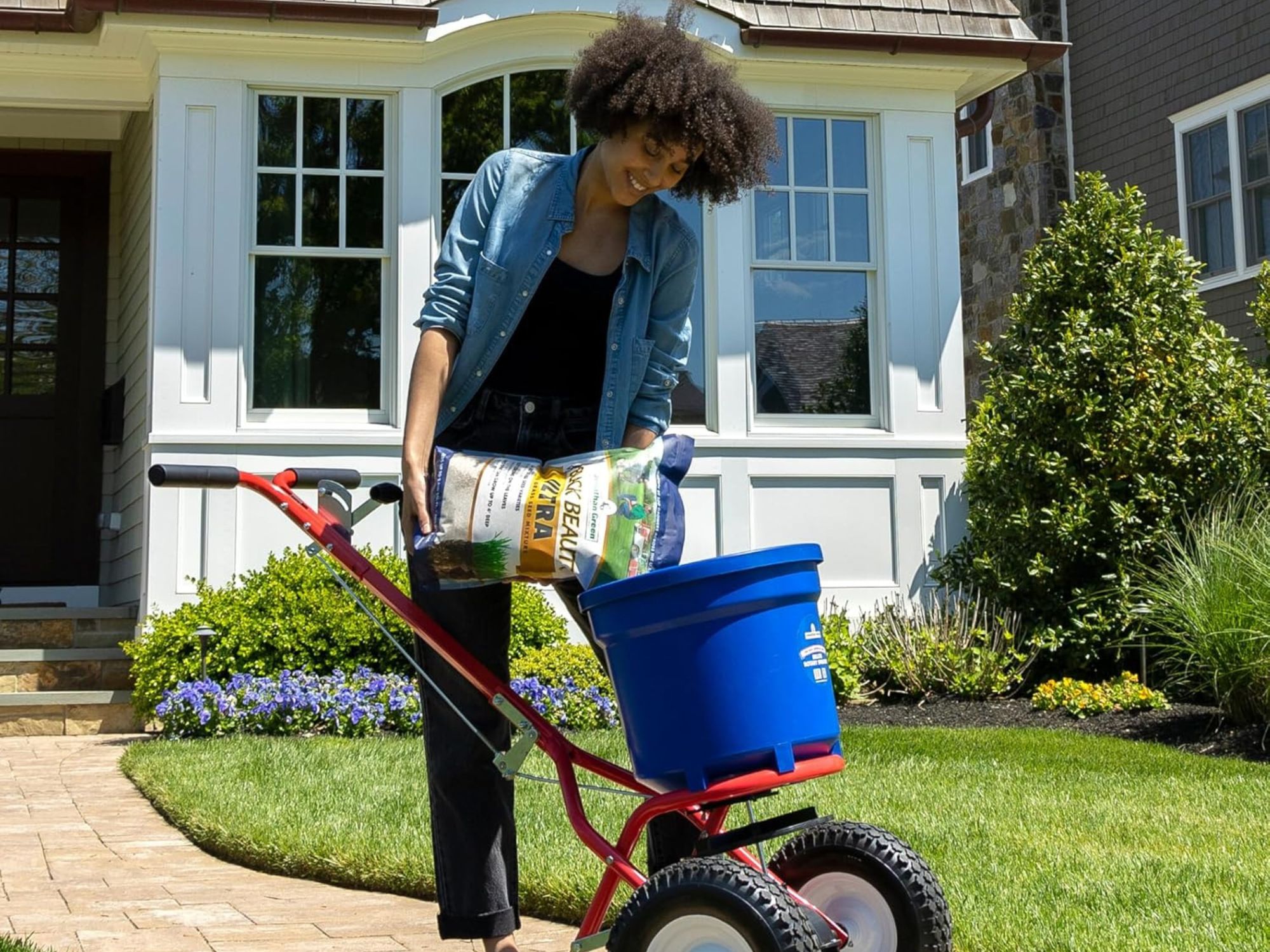
How We Chose the Best Grass Seed
We interviewed Ryan Farley, CEO of LawnStarter, headquartered in Austin, Texas, to gain insight into what to look for in the best grass seed varieties. “I’d say climate and how shady vs sunny your yard is are both going to be essential considerations when you’re choosing a grass seed. Foot traffic is another important one, since if you do have a lawn that’s getting lots of traffic, you will want to pick a grass seed that can ultimately stand up to that,” advises Farley.
With those considerations in mind, we researched the most sought-after grass seed products in their respective categories, keeping in mind their type, suitable season(s), intended use, and other special features
Kentucky bluegrass, ryegrass, and fescue are the most popular types of good grass seed for lawn maintenance among users because they are suitable in multiple climates and grow thick, durable grass. While not as popular, Bermuda and zoysia grass types are also viable options for those who live in southern areas with a lot of sun. Moreover, depending on your needs, these mixes can cover small or large yards.
We also included grass seed types for overseeding to fix patchy areas on existing grass, as well as options for new plantings for your whole lawn. Plus, many of these options are mixes, which makes them easy to maintain without intense labor. For added convenience, select grass seeds in our list come with protective coatings to protect them from disease, aid in water retention, or have fertilizer built in.
What to Consider When Choosing Grass Seed
When deciding which grass seed is best for front yard or backyard landscaping, it’s crucial to consider several important factors, including climate, maintenance, and sun requirements. A good grass seed should thrive in the specific conditions of your yard. Check below for some elements you should consider when purchasing the right grass seed.
Types of Grass Seed
Grass seed falls into two main categories: warm-season and cool-season grasses. Warm-season grasses endure hot southern climates much better than cool-season grasses. During cold winters, warm-season grasses turn brown as they go dormant. Cool-season grasses grow quickly in the cool weather of fall and spring before going dormant in the summer heat. Warm-season grasses can be reseeded during the spring and summer, while spring and fall are the optimal time to reseed cool-season grasses.
Warm-Season Grass
- Bahia: This warm-season grass is popular in hot climates because of its heat tolerance and drought-resistant qualities. While other grasses burn to a crisp in the hot sun, with its broad leaves and coarse texture, Bahia grass thrives. This makes it an attractive grass species in the Deep South.
- Bermuda: As with many other warm-season grasses, Bermuda grass thrives in hot climates thanks to its exceptional ability to tolerate heat and withstand high traffic. Bermuda grass requires good drainage, full-sun exposure, and plenty of nutrients. The grass does not tolerate cold weather well, making it a good option in the southern part of the country.
- Buffalo: Even though it is considered a warm-season grass, buffalo grass thrives in a broad range of climates and is quite common in states such as Montana that experience harsh winters. Like other warm-season grasses, it goes dormant and turns brown in colder weather. Planting season for buffalo grass is from April to May.
- Centipede: Centipede grass is known for being heat tolerant and very low maintenance. This makes it a popular grass for those who don’t enjoy spending a lot of time managing their lawns. Centipede grass thrives in full sun but will tolerate some shade. Due to those requirements, it does best in the Southeast. Plant centipede grass seed in the spring when all danger of frost has passed.
- St. Augustine: One of Florida’s most popular grasses, St. Augustine can tolerate high heat and humidity. It features blue-green grass blades that spread quickly through a lawn. St. Augustine also can tolerate salt water, which makes it a popular option for coastal yards. Since it spreads rapidly, one of the most effective ways to establish St. Augustine grass is by planting plugs. Plant St. Augustine seed in the spring or the summer.
- Zoysia: Zoysia is a durable, dense variety of grass that’s known for its ability to stand up to heat, drought, and high foot traffic. Possibly the softest grass for bare feet, zoysia forms a dense lawn that chokes out weeds with very little maintenance required. Although some types of zoysia can only be grown from sod or plugs, some grass seed companies offer a variety that can grow from seed. Zoysia grass should be planted in the spring once the threat of frost has passed.
Cool-Season Grass
- Fescue: Tall, fine fescue grass seed is perhaps the most common grass type in the country. This is because it adapts well to many different climates as it tolerates heat, cold, shade, and drought reasonably well. This is primarily due to its deep roots that can reach as deep as 2 to 3 feet. Tall fescue is perhaps the easiest grass to grow, but it can suffer under heavy traffic. Plant and reseed fine fescue grass seed in the fall and spring. Shoppers will sometimes see fescue sold in all-season grass seed mixes, which claim they’re good year-round.
- Kentucky bluegrass: This is the type of grass most people imagine when they consider the perfect lawn. With its lush, deep-green appearance, Kentucky bluegrass is a prized species. This grass is not easy to grow, requiring a high level of maintenance and care. Its shallow root system does not tolerate heat well, making it more suitable for northern lawns. Kentucky bluegrass should be planted and reseeded in the spring and fall.
- Perennial ryegrass: Perennial ryegrass should not be confused with annual ryegrass, which is a temporary grass used for erosion control. Perennial ryegrass comes back year after year. Ryegrass germinates quickly, making it popular for new lawns. It does best in colder climates with mild summers; however, it can still be found in the southern part of the country. Perennial ryegrass should be planted or reseeded in the fall.
Climate
With enough determination and money, you can grow most of the above grass seeds anywhere in the country. It’s not uncommon to see beautiful Kentucky bluegrass lawns in the baking heat of the Southwest. Going against climate guidelines will make the job much harder and more expensive, requiring significant investments in irrigation systems, water, and fertilizers. Paying attention to climate will make establishing a lawn much more manageable. Consider where you live and what grass types will thrive in your region with minimal maintenance and watering.
Reseeding vs. New Planting
How you go about reseeding a lawn versus planting a new lawn is quite different. When seeding a new lawn, you’ll apply seed to the bare dirt you’ve prepared for new planting. According to Farley, applying grass seed for overseeding is a much easier process. “Pretty much all I recommend here is raking or dethatching to remove any layer of debris so your seed can reach the soil directly, then watering thoroughly to ensure the seeds get into the soil and have the moisture they need to germinate.”
With that in mind, you typically need about twice as much seed to start a new lawn as you need to overseed an existing lawn.
Traffic Level
Different types of grass vary in how well they tolerate foot traffic. If you have kids or pets and plan to use your backyard extensively as an area for play, consider selecting grass types that can take some abuse and still keep on growing. Zoysia and Bermuda grasses are the most tolerant of foot traffic, while fescue does poorly with heavy traffic.
Required Maintenance
While some property owners enjoy fussing over their lawns, many homeowners dread long hours spent maintaining a yard. Consider which types of grass require the least care and how much work you’re willing to put into a lawn. Zoysia grass, for example, requires annual dethatching, while perennial ryegrass will not self-repair and requires patching. Bermuda grass, in comparison, is a low maintenance lawn grass.
Also, keep in mind that regardless of the type, newly planted grass seed needs watered. The best time to water grass is early morning, but many varieties require twice per day waterings until germination.
Sun Exposure
Various grasses tolerate different levels of sun exposure. Some grasses, such as Bermuda grass, demand full sun, but other varieties, such as tall fescue, do well with partial shade. Assess the sun exposure of your lawn to determine a good lawn grass seed for the lighting conditions there. Some seed companies produce specific seed mixes, such as grass seed for shade, full sun, or lawns with shaded areas and full sun areas.
Single Seed vs. Mix
When selecting a type of grass seed, you can choose one specific seed type or a blend that combines several different species. Go for a single seed type if you’re trying to achieve a particular look for your lawn. While single seeds are more difficult to maintain, the effect of a single-species lawn can be well worth it.
Mixes are easier to grow and maintain because companies blend the mixes for improved drought or heat tolerance. They also generally grow more uniformly with little need for patching. However, your lawn will lack the attractive uniform look of a single-species lawn.
Germination Percentage
Despite your best efforts to prepare your yard for seeding, some seeds simply weren’t meant to become plants. This is where germination percentage comes into play. Germination percentage is a measure of the viability of a collection of seeds. It is calculated by dividing the number of seeds that germinate by the total number of seeds.
Given how much grass seed can cost, the higher the germination percentage the better, and it mostly relates to seed quality. Although you might be tempted to buy the cheapest grass seed on the shelf, chances are it will have a lower germination percentage, resulting in significant waste. High-quality grass seed has a 90 to 95 percent germination rate, making it worth the additional investment.
Grass typically germinates within 5 to 30 days. However, If you’re wondering how long it takes for grass to grow to maturity, that depends on the variety. Cool-season varieties grow faster than warm-season grasses. No matter what you choose, you’re likely to have a mowable lawn within two months of planting.
FAQs
If you’re still wondering what product is best for you, read on for answers to your most pressing grass-seed questions.
The best month for planting grass seed is September for cool-season grasses and May for warm-season grasses, although when to plant grass seed can vary depending on where you live. For cool-season grasses, you want a combination of warm soil, moderate temperatures during the day, and cool temperatures at night. Warm-season grasses should be planted when temperatures eclipse 80 degrees during the day and remain warm through the night.
Once you’ve purchased your seed, you’ll need to prepare the soil. If reseeding to fill in the lawn or patches of dead grass, cut the grass to a height of 1.5 to 2 inches. Lightly rake the area to break up the soil’s surface, so it can receive the seeds. For new lawns, prepare the ground, making sure to even out the surface. Use a spreader to distribute the recommended amount of seed for reseeding or planting a new lawn.
If possible, use a soil test kit to determine the pH of your soil. Depending on the results, you might need to add organic matter such as lime, compost, topsoil, or peat moss to your soil. Once you’ve completed that step, break up the top ½-inch of the earth with a rake. The soil needs to be loose to accept the seeds.
Mixing grass seed with topsoil is not a good idea. By combining the two, it’s difficult to spread the seeds evenly throughout the yard. It also might cause some seeds to be buried too deep into the soil to germinate and grow. For better results, spread the seed after mixing topsoil into the yard.
It’s best not to cover the grass seed with topsoil. Grass seeds are not strong enough to push through heavy earth after germinating. Covering the seeds with topsoil suffocates them, preventing them from growing.
Why Trust Bob Vila
Bob Vila has been America’s Handyman since 1979. As the host of beloved and groundbreaking TV series including “This Old House” and “Bob Vila’s Home Again,” he popularized and became synonymous with “do-it-yourself” home improvement.
Over the course of his decades-long career, Bob Vila has helped millions of people build, renovate, repair, and live better each day—a tradition that continues today with expert yet accessible home advice. The Bob Vila team distills need-to-know information into project tutorials, maintenance guides, tool 101s, and more. These home and garden experts then thoroughly research, vet, and recommend products that support homeowners, renters, DIYers, and professionals in their to-do lists.



